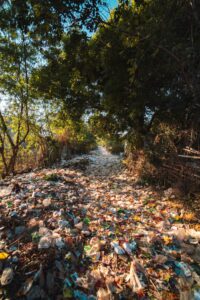Photo: Pexels/Lucien Wanda
By Fiona Mathews
The calendar is studded with environmental awareness days that seem to come around ever more rapidly. One of the latest ones, on July 28, was a red-letter day for the planet. It marked this year’s Global Plastic Overshoot Day. The day highlighted the point at which global waste management systems can no longer handle plastic materials effectively.
Swiss-based research consultancy Earth Action has run the figures and, based on these, plastic production has increased 20 times more rapidly than the recycling capacity over the past 10 years. As a global society we now rely heavily on plastic. As a packaging material alone it is lightweight, strong, easy to sterilise and robust.
How it is managed at the end of its life is the real issue, and one of the many countries that suffer these consequences is India. Years of mismanaged waste disposal has left the country quite literally awash with the less recyclable forms of plastic. The Earth Champions Foundation, working on an Innovate UK study comparing the Indian and the UK ways of managing plastic film waste, gave us an insiders’ perspective on the importance of keeping things local rather than imposing big infrastructure.
The Pune Pickers are a perfect example of amplifying a community’s existing sustainability efforts by going to the source of the issue. Established in 1993 by one enterprising local woman, the Pune Pickers were part of an 11,000 strong group of waste pickers who trawled the local dumps and landfills.

Realising that their relentless efforts were making little to no difference, Suchita, along with 5,000 pickers, decided to get closer to the source of the waste and formed a co-operative to go directly to the people in the shanties and houses to collect wet and dry waste.
Going from house to house they set up a low-cost service to collect household recyclable materials and other waste such and food and non-recyclable materials, that they then separated into fractions to gain maximum value from what they collected.
Focusing on 200 houses each, these pickers worked 6 days a week, effectively diverting the waste before it contributed to the already colossal and growing landfill mountain or entered the rivers.
The first thing that struck us when we met these enterprising pickers were their abysmal work conditions. This was rapidly followed by the realisation that the existing infrastructure meant that much of the waste they collected offered no financial benefit to the pickers.
Plastic film, for instance, was not remunerated and with no alternative the pickers left it in the waste stream. Some of it was also discarded into rivers that eventually dumped it into the sea.
We saw an opportunity to improve the recycling infrastructure to address this issue at a local level. Working with recycling specialists on our team we set up a micro-processing system that could take this film and upgrade it so that it could be recycled into new products. The project would train local engineers to manage the basic machinery and understand the process so they would train others and advise pickers on best ways to manage, dispose of, and recycle what they collected.
The pickers needed support to improve their work conditions through the use of gloves and uniforms and to give them a safe area where they could sort what they collected. Two key areas we identified as requiring urgent upgrading were sanitisation and clean drinking water.
We visited the mayor of Pune, who was not aware of the pickers extraordinary contribution to the city. She agreed to our building a plant to give support to the women and endorsed our running an Earth Champions Discovery Programme to uncover other enterprising sustainability efforts in the city. As this was only months before COVID struck we are only now setting this out. In the meantime the Mayor has now approved the pickers to run the whole city of Pune.
As the Pune Pickers had identified, to be effective sustainability projects need to go to the source of the problem rather than the symptom. Endless beach cleaning is akin to moping up the water from the floor whilst leaving the bath taps running.
Ultimately it is too late once the plastic is in the rivers and seas. Much of the plastic sits at the bottom of the ocean and the remaining waste float on the top and washes back up on the beaches with new plastic waste feeding straight back into the waterways and ultimately the sea again. Whilst beach cleaning is of course commendable it is also going to be relentless and endless until we move back up the waste stream.
The Pune Pickers are just one example amongst literally millions. It has been estimated that there are some 20 million workers across the globe working in similar conditions, with similar constraints and often with little infrastructure to maximise the value of what they collect. Yet despite this they are responsible for approximately 60 percent of plastic recycling worldwide.
In virtually every country where waste pickers work their demographics intersect with some of the most marginalised populations in the world. If we flipped the model and valued their contribution instead, we could trigger a step-change across the globe. If we set up localised infrastructure to support their efforts the entire exercise would be transformational.
And that is what we need: a transformational approach to managing our waste, our resources and our people. As Inger Andersen, the executive director of the UN Environment Program, emphasised at the latest round of treaty talks, we need to “redesign for justice, for the workers of the informal waste sector.”
Fiona Mathews is the founder and CEO of Earth Champions Foundation, which was launched with Nelson Mandela in 2000 and has held five successful programmes in different locations, including Australia, Switzerland, Hong Kong and the United Kingdom.
Did you like it? 4.4/5 (28)








